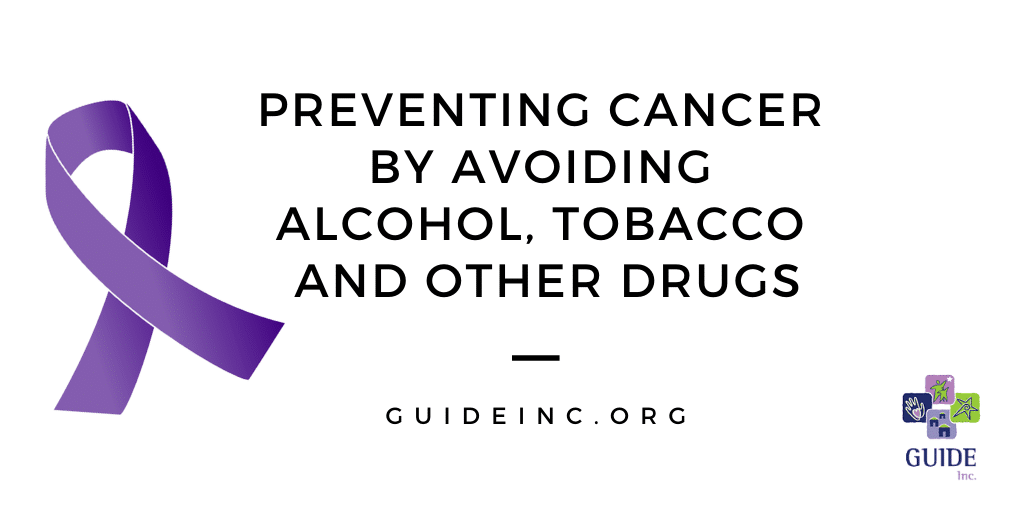As prevention advocates, it’s important that we raise awareness about the risks and consequences of substance use. One of those potential consequences is an increased likelihood of developing cancer, but this can be prevented.

According to the American Association for Cancer Research, “research has shown that more than 40 percent of all cancers diagnosed and nearly half of all deaths from cancer in the United States can be attributed to preventable causes…”
At GUIDE, prevention is the cornerstone of all the work we carry out across the state of Georgia. As we reflect on substance abuse prevention, we recognize the ways in which avoiding alcohol, tobacco and other drugs can not only improve our health and quality of life but also play an important role in preventing cancer.
Below, we share the connections between common substances and cancer, resources for finding more information and GUIDE materials that may tell more about prevention.
Alcohol
According to the CDC, drinking alcohol raises your risk of getting six types of cancer: mouth and throat, larynx, esophagus, colon and rectum, liver and breast (in women). All types of alcoholic beverages are linked with cancer.
Alcohol influences cancer development because it produces toxic chemicals in your body, damages DNA and allows cancerous cells to grow, raises estrogen levels in women to fuel cancer growth and makes the body less able to absorb important vitamins and nutrients (WebMD).
National Cancer Institute at the National Institutes of Health is a great resource for extensive information on alcohol and cancer.
For information about general alcohol use prevention, see our Inspired to Make Healthy Choices newsletter on Rethinking Drinking.
Tobacco
The CDC states that smoking tobacco products causes almost nine out of every 10 cases of lung cancer, but smoking can also cause cancer almost anywhere in the body.
Tobacco smoke has at least 70 chemicals that cause cancer, called carcinogens. When carcinogens get into your bloodstream, they can damage your DNA, causing cancer cells to develop.
Traditional smokers are not the only people who are susceptible to getting cancer. Smokeless tobacco products (dipping and chewing tobacco) and e-cigarettes (vapes) both contain nicotine, which means they also carry the risk of causing cancer.
American Cancer Society is a great place to start to learn more about tobacco and cancer.
For information about general tobacco cessation, see our Inspired to Make Healthy Choices newsletter on Ending Tobacco Use.
Other Drugs
According to Addiction Center, illicit drugs such as cocaine and heroin are often mixed, or “cut”, with toxic cancer-causing chemicals in order to create more of the drug. A commonly used cutting agent is phenacetin, which has been linked to cases of renal, pelvis and ureter cancer.
In addition, the National Institute on Drug Abuse shares that young adult males who use marijuana and began using it during adolescence are at greater risk for an aggressive form of testicular cancer.
For information about general marijuana use prevention, see our Inspired to Make Healthy Choices newsletter on Teen Marijuana Use.
It’s safe to say that using alcohol, tobacco and other drugs isn’t worth the risk of developing cancer that it carries! The evidence is clear – the less you engage in substance use, the lower your risk of cancer.
Georgia Resources to Address Substance Abuse
For immediate access to routine or crisis services, call the Georgia Crisis and Access Line (GCAL) at 1-800-715-4225. GCAL provides immediate, free and confidential support 24/7.
The Georgia Tobacco Quit Line (1-877-270-STOP) is a free, confidential service available to assist with quitting smoking and all forms of tobacco.
